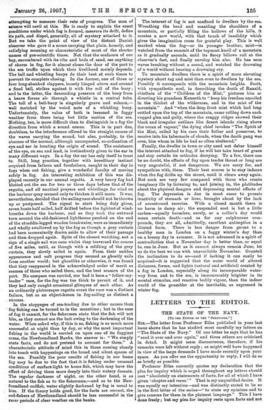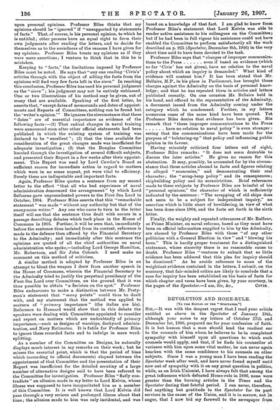LETTERS TO THE EDITOR.
THE STATE OF THE NAVY.
[To Tat EDMOS OT TBK SPECTAT08:1 Six,—The letter from Professor Biles published in your last issue shows that be has studied most carefully my letters on "The State of the Navy." Of one letter be says that be has "read it over and over again," and three others are criticised in detail. It might seem discourteous, therefore, if his remarks were left without reply ; as might well have happened in view of the large demands I have made recently upon your space. As you offer me the opportunity to reply, I will do so as briefly as possible.
Professor Biles correctly quotes my declaration that the plea for inquiry which is urged throughout my letters should rest "absolutely on statements of facts, for all of which I have given 'chapter and verse." That is my unqualified desire. It was equally my intention—and was distinctly stated to be so in the first letter of the series—" to state my opinions and to give reasons for them in the plainest language.", This I have done freely ; but my plea for inquiry rests upon facts and not
upon personal opinions. Professor Biles thinks that my opinions should be "ignored" if "unsupported by statements of facts." That, of course, is his personal opinion, to which he is entitled; other persons have an equal right to form their own judgments after reading the letters, and to decide for themselves as to the soundness of the reasons I have given for my opinions. Professor Biles treats my opinions as if they were mere assertions; I venture to think that in this he is mistaken.
Keeping to "facts," the limitations imposed by Professor Biles must be noted. He says that "any one reading Civis's' articles through with the object of sifting the facts from the opinions will find very few facts left in the sieve." In reaching this conclusion, Professor Biles has used his personal judgment as the " sieve " ; his judgment may not be entirely unbiassed. One or two illustrations of his method may be given, out of many that are available. Speaking of the first letter, he asserts that, "except dates of memoranda and dates of appoint- ments and Reports of Committees, nothing can be found but the 'writer's opinion." He ignores the circumstance that these "dates" are of essential importance as evidence of the following facts —Cl): That radical changes in naval training were announced soon after other official statements had been published in which the existing system of training was declared to be " excellent "; (2) that the time available for consideration of the great changes made was insufficient for adequate investigation ; (3) that the Douglas Committee hurried through the investigation of several difficult subjects, and presented their Report in a few weeks after their appoint- ment. This Report was used by Lord Cawdor's Board as sufficient reason for immediate action in regard to matters which were in no sense urgent, yet were vital to efficiency. Surely these are indisputable and important facts.
Again, Professor• Biles quotes a sentence from my second letter to the effect "that all who had experience of naval administration denounced the arrangement" by which Lord Selborne gave unprecedented powers to the First Sea Lord in October, 1904. Professor Biles asserts that this "remarkable statement" was made "without any authority but that of the anonymous writer." Any one who cares to turn to the letter itself will see that the sentence thus dealt with occurs in a passage describing debates which took place in the House of Commons in 1905. Further, it will be seen that, immediately before the sentence thus isolated from its context, reference is made to the defence then offered by the Financial Secretary to the Admiralty ; and immediately after this sentence the opinions are quoted of all the chief authorities on naval administration who spoke,—including Lord George Hamilton, Mr. Robertson, and Sir John Colomb. I need make no comment on this method of criticism.
A similar method is adopted by Professor Biles in an attempt to blunt the weapon I drew from another speech in the House of Commons, wherein the Financial Secretary to the Admiralty tried to justify the perpetual presidency of the First Sea Lord over Committees, on the ground that it was thus possible to obtain "a decision on the spot," Professor Biles endeavours to make a distinction between Mr. Pray- man's statement that "many points" could thus be dealt with, and my statement that the method was applied to matters of "primary importance" (the italics are his). Reference to Hansard would show that in this debate the speakers were dealing with Committees appointed to consider and report on matters which are undoubtedly of primary importance,—such as designs of warships, dockyard adminis- tration, and Navy Estimates. It is futile for Professor Biles to ignore these recorded facts and to indulge in mere word- splitting.
As a member of the Committee on Designs, he naturally displays much interest in my remarks on their work ; but he misses the essential point, which is that the period of time which (according to official documents) elapsed between the appointment of that Committee and the presentation of their Report was insufficient for the detailed scrutiny of a large number of alternative designs said to have been referred to the Committee for investigation. Professor Biles "flatly con- tradicts" an allusion made in my letter to Lord Kelvin, whose illness was supposed to have incapacitated him as a member of this Committee. It is well known that Lord Kelvin did pass through a very serious and prolonged illness about that time; the allusion made to him was only incidental, and was
based on a knowledge of that fact. I am Oa to know from Professor Biles's statement that Lord Kelvin was able to render active assistance to his colleagues on the Committee; but if he had been in full vigour his assistance could not have enabled the Committee to perform satisfactorily all the work described on p. 925 (Spectator, December 8th, 1906) in the very short time said to have been devoted to the task.
Professor Biles says that "charges of improper communica-
tions to the Press even if based on evidence.(which so far Civis' has not given), have no relation to the naval policy about which an inquiry is demanded." What kind of evidence will content him P It has been stated that Mr. Bellaire, M.P., in his place in Parliament, has brought these charges against the Admitulty on the basis of personal know- ledge; and that he has repeated them in articles and letters published recently. On one occasion Mr. Bellaire held in his hand, and offered to the representative of the Admiralty, a document issued from the Admiralty coming under the category which he condemned. Further, in ray letters numerous cases of the same kind have been quoted. Yet Professor Biles denies that evidence has been given. His remark that "these improper communications to the Press
have no relation to naval policy" is even stranger.: seeing that the communications have been made for the purpose of " bolstering-up" that policy and influencing public: opinion in its favour.
Having minutely criticised four letters out of eight, Professor Biles remarks: "It does not seem desirable to discuss the later articles." He gives no reason for this abstention. It may, possibly, be accounted for by the circum- stance that these articles abound in facts and figures relating to alleged "economies," and demonstrating their real character; the "scrap-heap policy" and its consequences; shipbuilding policy and its eccentricities. Brief references made to these subjects by Professor Biles are brimful of his "personal opinions," the character of which is sufficiently indicated by the sentence "The scrapping of old ships does not seem to be a subject for independent inquiry," an assertion which is little short of bewildering, in view of what has been done since 1904, and the facts set forth in the sixth letter.
Finally, the weighty and repeated utterances of Mr. Balfour, as Prime Minister, on naval reforms, based as they most have been on official information supplied to him by the Admiralty, are classed by Professor Biles with those "of any other politician with a General Election in view" and "blowing his horn." This is hardly proper treatment for a distinguished statesman, whose sincerity there is no reasonable cause to doubt. Professor Biles "ventures to submit that so little evidence has been adduced that this plea for inquiry should be dismissed." As he avoids reference to some of the weightiest evidence contained in the letters, I submit, on the contrary, that fair-minded critics are likely to conclude that a case for inquiry has been established on the basis of facts for which chapter and verse have been given, by your courtesy, in the pages of the Spectator.—I am, Sir, &c.,























































 Previous page
Previous page